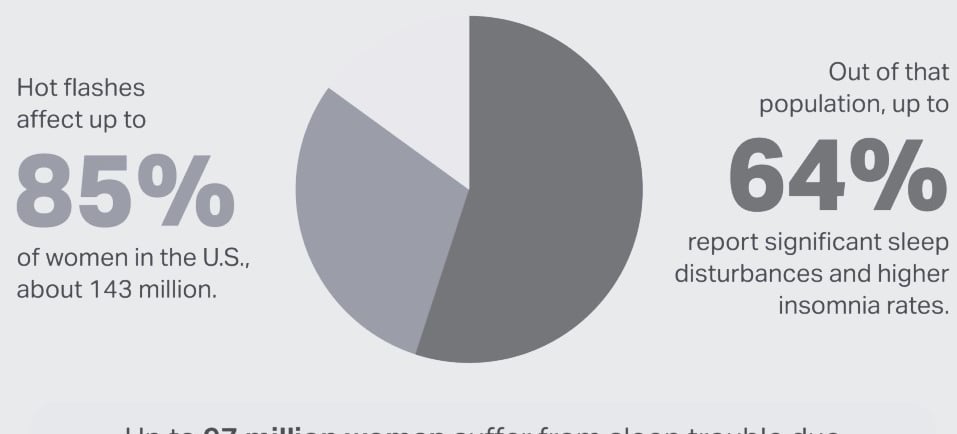Understanding Night Sweats and Menopause
Learn why night sweats are common during menopause and when they may indicate a more serious health issue like infection or diabetes. premenstrual syndrome, birth control, fertility, menopause and more


What Are Night Sweats?
Night sweats refer to episodes of excessive sweating during the night that can drench sleepwear and bedding. Unlike simply feeling too warm, night sweats are characterized by a significant amount of perspiration that can disrupt sleep and affect overall well-being. This condition is a common issue among women and can vary in intensity, from mild dampness to severe soaking.
Night sweats are different from the occasional experience of feeling overly warm due to heavy blankets or a high room temperature. They frequently occur even when the sleeping environment is cool and comfortable, indicating a possible underlying concern. These episodes can lead to frequent awakenings, causing a fragmented sleep pattern that impacts the quality of rest and daily functioning.
While night sweats can occur in anyone, they are particularly prevalent among women. Various life stages, such as perimenopause and menopause, can contribute to their occurrence. Hormonal fluctuations during these periods are a significant contributor to the excessive sweating experienced at night. Additionally, certain medical conditions, medications, and lifestyle factors can also trigger night sweats. For instance, infections, autoimmune disorders, and certain types of cancer might present with night sweats as a symptom.
Understanding the nature of night sweats is crucial for identifying potential causes and seeking appropriate remedies. The distress and discomfort caused by these episodes can lead to a diminished quality of life, affecting mood, energy levels, and overall health. Recognizing the difference between normal sweating and night sweats can aid in diagnosing and addressing any underlying medical issues that may be present.
In summary, night sweats are more than just a minor inconvenience; they are a significant health issue that can signal underlying medical conditions. By identifying and addressing the causes, women can improve their sleep quality and overall well-being, ensuring they maintain a balanced and healthy life.
Common Causes of Night Sweats in Women
Night sweats in women can be attributed to a variety of factors, with hormonal changes being one of the most prominent causes. Menopause and perimenopause are significant triggers, predominantly due to fluctuating estrogen levels. As women approach menopause, the body undergoes substantial hormonal shifts, which can lead to episodes of intense sweating during the night. This phenomenon is often accompanied by other symptoms such as hot flashes, irregular menstrual cycles, and mood swings.
Beyond hormonal changes, other medical conditions can also contribute to night sweats. Hyperthyroidism, a condition characterized by an overactive thyroid gland, can accelerate metabolism and increase body temperature, resulting in excessive sweating. Infections, such as tuberculosis and endocarditis, are known to cause night sweats as well. Additionally, certain medications, including antidepressants and antipyretics, can have side effects that include night sweats.
Lifestyle factors play a crucial role in the occurrence of night sweats. High levels of stress and anxiety can stimulate the body's fight-or-flight response, leading to increased sweating. Dietary choices, such as the consumption of spicy foods, caffeine, and alcohol, can also elevate body temperature and trigger nocturnal sweating. It is important to evaluate these lifestyle elements when addressing night sweats, as they can often be managed or mitigated through behavioral changes.
Understanding the root cause of night sweats is essential for effective management and treatment. By identifying whether the symptoms are due to hormonal changes, medical conditions, medications, or lifestyle factors, women can take appropriate steps to alleviate the discomfort associated with night sweats. Consulting a healthcare provider can provide further insight and guidance in developing a personalized approach to managing this condition.
Managing and Treating Night Sweats
Night sweats can be an uncomfortable and disruptive symptom experienced by many women. Effective management and treatment strategies can significantly alleviate this condition. A combination of lifestyle changes and medical interventions can provide relief and improve sleep quality.
First and foremost, creating a cool sleeping environment is essential. This can be achieved by keeping the bedroom temperature low, using fans, or investing in air conditioning. Opting for moisture-wicking sleepwear and breathable bedding materials, such as cotton or bamboo, can help to absorb sweat and keep the body cool throughout the night.
Dietary habits also play a crucial role in managing night sweats. It is advisable to avoid consuming spicy foods and caffeine before bedtime, as these can trigger sweating episodes. Instead, focus on a balanced diet rich in fruits, vegetables, and whole grains, which can support overall health and potentially reduce the frequency of night sweats.
Stress management techniques are another valuable tool in addressing night sweats. Practices such as meditation, deep breathing exercises, and yoga can help to reduce stress levels, which in turn may minimize the occurrence of night sweats. Incorporating these activities into a daily routine can promote relaxation and enhance sleep quality.
For those who continue to struggle with night sweats despite lifestyle modifications, medical interventions may be necessary. Hormone replacement therapy (HRT) is one option, particularly for women experiencing menopause-related night sweats. HRT can help to balance hormone levels and reduce symptoms. Additionally, other medications, such as antidepressants or anti-anxiety drugs, may be prescribed by a healthcare provider to address underlying causes.
It is important to consult with a medical professional to determine the most appropriate treatment plan for individual needs. Personalized advice from a healthcare provider ensures that any underlying health conditions are addressed, and the most effective strategies are implemented for managing night sweats.
